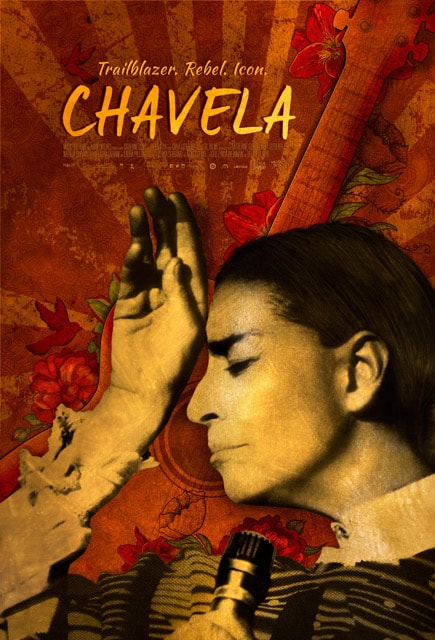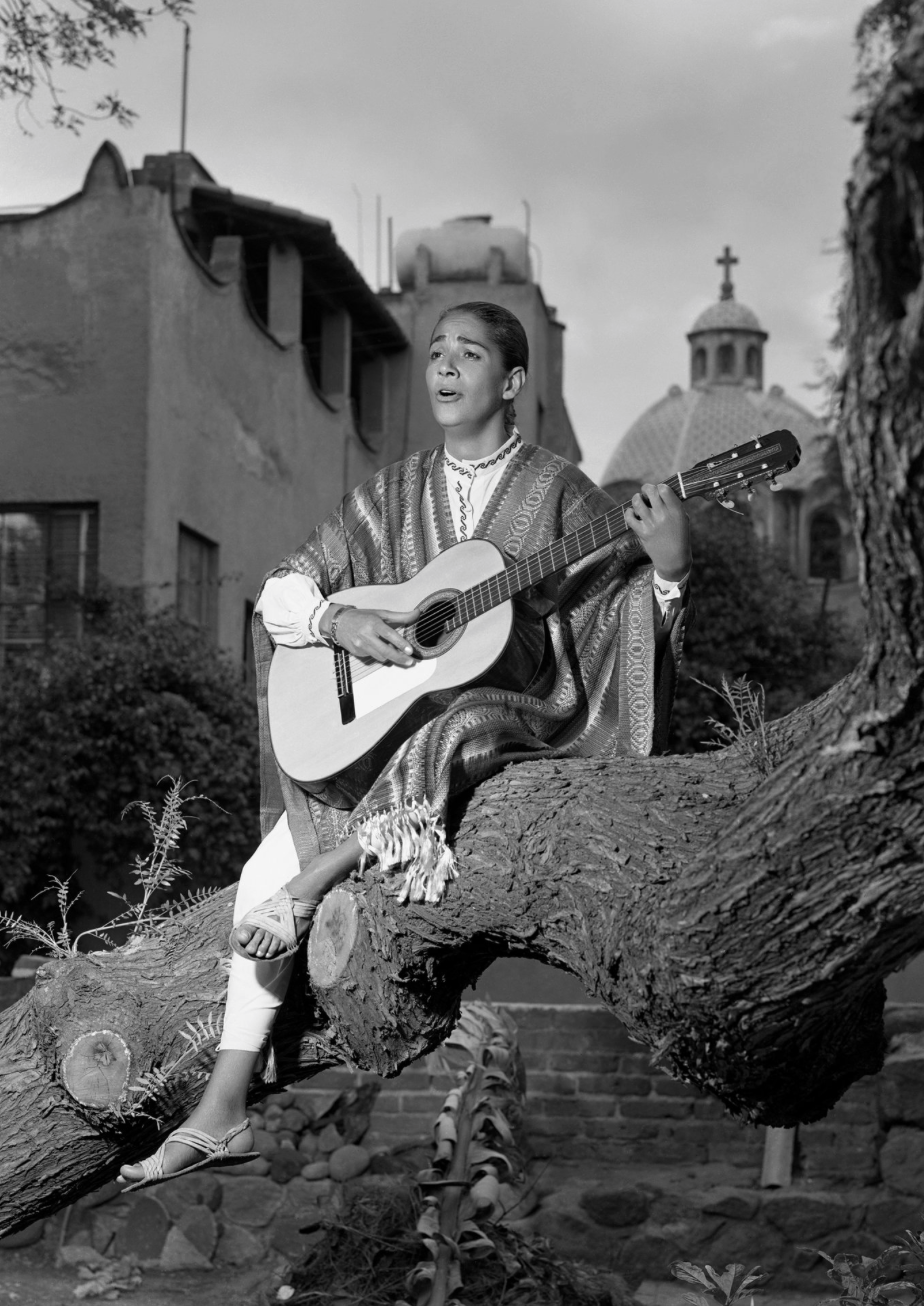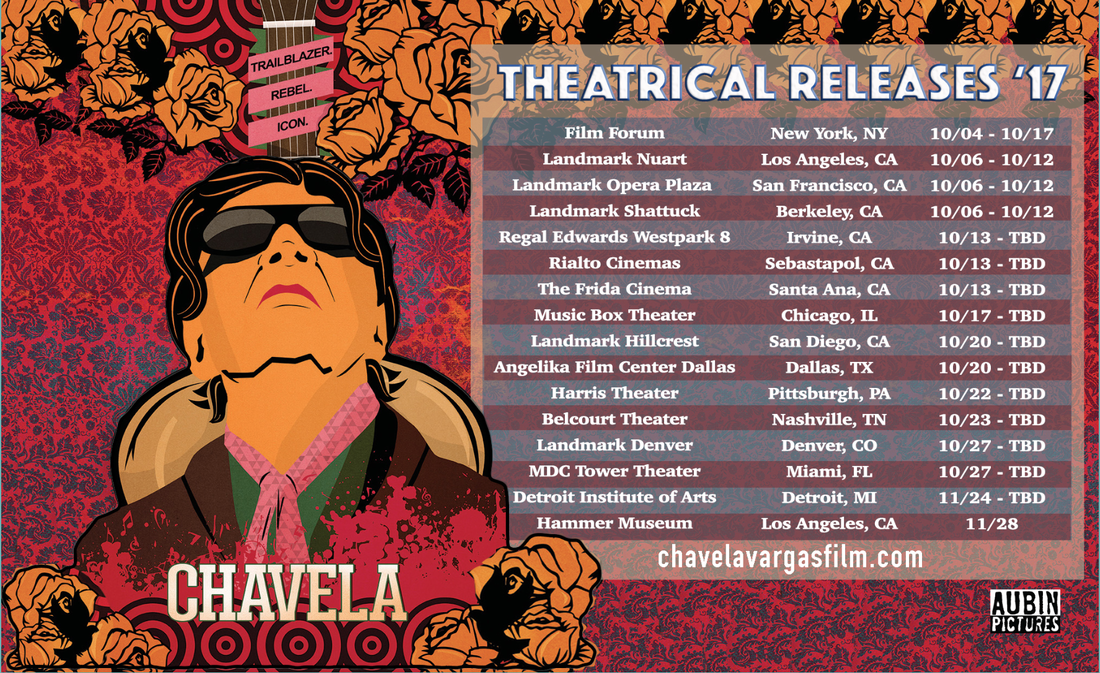|
Director Catherine Gund on her compelling subject: 'She's such a sexy person... she infuses the people around her with desire'
One of my favorite documentaries of the year opens today in Los Angeles, San Francisco and Berkeley, California.
Chavela tells the moving story of Mexican singer Chavela Vargas -- ridiculed as a girl for her masculine demeanor -- who overcame homophobia, an abusive past and severe alcoholism to become one of the world's most captivating performers. She enchanted audiences from Mexico City to Madrid and New York, inspired filmmaker Pedro Almodóvar, and along her journey engaged in passionate romances with many women, reputedly including artist Frida Kahlo. Catherine Gund and Daresha Kyi directed the film, which began playing at New York's Film Forum on Wednesday. You hear all these stories of everyone being in love with her, her having all these beautiful affairs. I definitely felt the butch magnetism she exuded.
Chavela is built around songs she performed in concert at various stages of her long life, songs of such stirring intensity they raised the hair on the back of my neck. Gund was fortunate to see Vargas live on stage and to record some of those concerts while on an extended stay in Mexico in 1991.
"I was hanging out with some other young lesbians and they said, 'You gotta hear this music.' We went to El Hábito (in Mexico City) and I carried my video camera around in my backpack because I'd been filming all the AIDS activism that we were doing in Act-Up," Gund recalled in conversation with Nonfictionfilm.com. "I thought, 'Oh, I should record this concert' because my friend said, 'She's getting so much older. She's 71 but she's really important. She's an icon in our community.' And so we filmed."
The film traces the peaks and valleys of Chavela's difficult though ultimately triumphant life, with the songs serving as a kind of narrative and commentary on her experiences. She was born in Costa Rica, essentially abandoned by her family and moved to Mexico at age 14, singing in the streets.
From her youth she rejected traditional feminine comportment, preferring to dress in pants and smoke cigars. She even toted una pistola. It's hard to imagine that a woman wearing pants [in that era] was so radical, but she wasn't trying to be radical," Gund told me. "She was just alone and she was herself." I was born singing.
She became known for singing música ranchera, broken-hearted ballads of men boozily lamenting their losses in love. Chavela both transformed the songs and left them the same -- she didn't alter the lyrics to come from the perspective of a woman lamenting the loss of a man.
"When she sings them [she] infuses them with her gravel and her depth and her gravitas. She doesn't change the pronouns and they are songs to women," Gund noted. "There's a way that she makes them her own... She knew so much about love and loss and death and sadness and solitude and her music ripples with all of that."
One of the goldmines in the film is a previously unseen interview with Chavela from 1991, which Gund shot after she and friends were invited to spend time with the singer at her home. The exchange came at a pivotal moment in Chavela's life when she was just returning to the stage after a bleak period of more than a decade marked by ruinous alcoholism.
"It was just lucky I had this camera and caught this very intimate, feisty conversation, dialogue, among these young lesbians and their icon," Gund recalled. In her voice I have found one of my best collaborators.
Gund does not lay claim to having had a close friendship with Chavela. But she says the time she spent in her presence remains a cherished memory.
"I wish I could say I had a relationship [with her]," Gund mused. "I can still feel it in my body when she'd say, 'cariña' ['sweetheart']. She'd call me darling. 'You have so much heartbreak in your future.' She was beautiful. She's such a sexy person that she sort of infuses the people around her with desire." She added, "You hear all these stories of everyone being in love with her, her having all these beautiful affairs. I definitely felt the butch magnetism she exuded." Vargas was not one to kiss and tell, but one of those 'beautiful affairs' was with Kahlo, many believe. The film includes evocative footage of the painter and her husband, muralist Diego Rivera. Gund said when those unfamiliar with Vargas hear she was intimately involved with Frida, their interest level skyrockets. "[When I say to people] she was lovers with Frida Kahlo they just light up. Like, 'Oh really? I want to see that movie!' She was qué hermosa."
Chavela never pretended to be straight, yet for many years felt uneasy being publicly labeled a lesbian.
"She wasn't hiding who she was. She just wasn't able to embrace this word... that had been used to put her down and make her less than," Gund related. "It was later in her life, with the force of the international queer movement behind her, that she was able to just say, 'Yes, I'm part of this. This is who I am.' That wasn't a shift, that wasn't a change in her identity... She never hid. She was always true to herself." When you're true to yourself, you win in the end.
The film doesn't hide the emotional scars that could make Chavela a violent and difficult person toward those who were closest to her. But those scars also are what made her music so riveting.
"She says, I suffered a lot and I take my pain and my grief and I put it out on stage and you all find it beautiful.' There's a reciprocality in that statement where the echo of the beauty that the audience feels somehow goes back to her and transforms the negativity into something she can embrace." In the last two decades of her life Chavela enjoyed a career renaissance that resulted in part from the tireless support she received from Almodóvar. Through his intercession with concert promoters in Europe and the U.S. he won her gigs in venues where she had always dreamed of performing. "[After] she met Pedro Almodóvar she went to Spain. She performed at Bellas Artes [in Mexico City], Olympia [in Paris], Carnegie Hall, all over the world," Gund said. "She went on to actually to have a whole incredible second chapter. She really rose form the ashes like a phoenix."
Above all, the documentary allows audiences to feel the spell the singer cast over fans at venues large and small, when artist and public became one.
"I think fusion is an ideal word for it because she breathed for the audience. I mean that is who kept her alive, it seems to me," Gund observed "And even towards the end [of her life] she wanted to die on the stage. She could not imagine living without performing... In her case it was partly that it fed her ego or made her feel competent or special but I think it was also because that was the place she didn't feel lost and abused and desperate and she didn't feel alone."
|
AuthorMatthew Carey is a documentary filmmaker and journalist. His work has appeared on Deadline.com, CNN, CNN.com, TheWrap.com, NBCNews.com and in Documentary magazine. |
- Home
- News
- Videos
-
Galleries
- 2019 Tribeca Film Festival
- Full Frame Documentary Film Festival
- 2019 SXSW Film Festival
- SXSW 2018 Gallery
- 2019 Sundance Film Festival
- Outfest 2018 Photo Gallery
- Outfest 2017
- Sundance 2018 Photos
- 2017 LA Film Festival
- 2017 Cannes Film Festival
- Tribeca Film Festival 2017
- SXSW 2017 Gallery
- 2017 Berlin Film Festival
- Sundance 2017 Gallery
- 2016 Los Angeles Film Festival
- Cannes Film Festival 2016
- SXSW 2016 Gallery
- Berlinale 2016 Gallery
- Sundance 2016 Gallery
- Filmmaker Gallery
- About
- Contact
Proudly powered by Weebly
- Home
- News
- Videos
-
Galleries
- 2019 Tribeca Film Festival
- Full Frame Documentary Film Festival
- 2019 SXSW Film Festival
- SXSW 2018 Gallery
- 2019 Sundance Film Festival
- Outfest 2018 Photo Gallery
- Outfest 2017
- Sundance 2018 Photos
- 2017 LA Film Festival
- 2017 Cannes Film Festival
- Tribeca Film Festival 2017
- SXSW 2017 Gallery
- 2017 Berlin Film Festival
- Sundance 2017 Gallery
- 2016 Los Angeles Film Festival
- Cannes Film Festival 2016
- SXSW 2016 Gallery
- Berlinale 2016 Gallery
- Sundance 2016 Gallery
- Filmmaker Gallery
- About
- Contact




 RSS Feed
RSS Feed